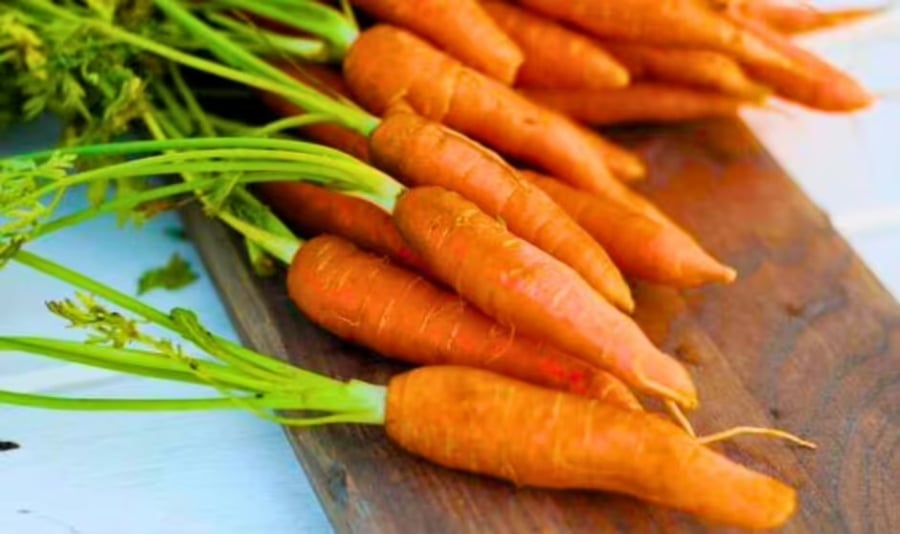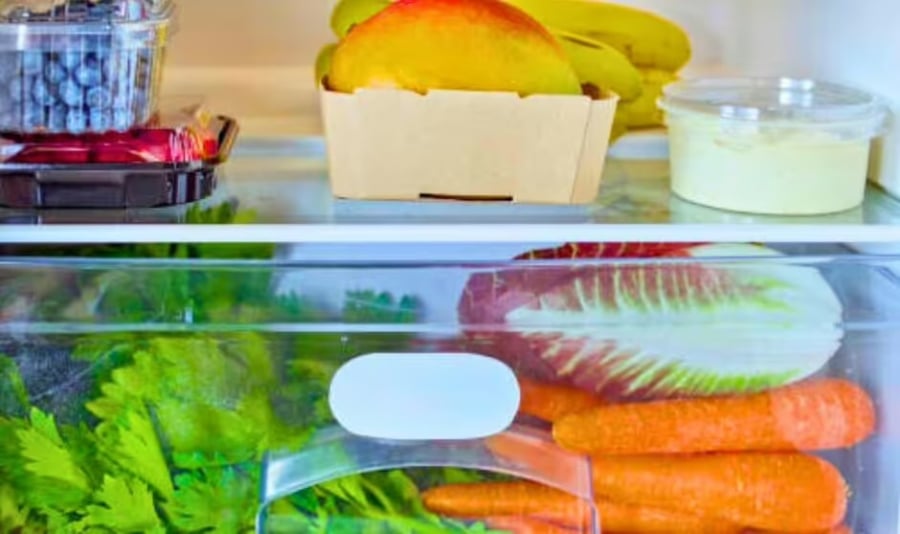Carrots are not just a popular vegetable, but also a nutrient-rich “superfood” offering a plethora of health benefits. Let’s explore the best practices for storing carrots to prolong their freshness.
Mistakes to Avoid When Storing Carrots in the Fridge
Simply placing carrots in the vegetable drawer is insufficient and may lead to quicker wilting and mold formation. The culprit here is ethylene gas, a natural hormone that accelerates the ripening process of fruits and vegetables. When produce that emits ethylene is stored together, the gas accumulates, hastening the spoilage of carrots.
Carrots are highly sensitive to ethylene emitted by tomatoes, onions, mushrooms, and leeks. To prolong their freshness, avoid storing carrots together with these ethylene-producing items.

The Best Method for Storing Carrots
According to culinary expert Laura Fuentes, the optimal way to store carrots is to submerge them in a sealed container of water and place it in the main body of the fridge. This method not only maintains moisture and crispness but also shields carrots from ethylene emitted by other produce.
Laura advises, “The key to keeping carrots fresh is to store them in a sealed container filled with water. Without moisture, carrots will become soft and develop a pale white outer layer. This often occurs with baby carrots or improperly stored carrots.”
Benefits of Storing Carrots in Water
Moisture Retention and Crispness: Carrots tend to lose moisture and become soft and dry when stored at higher temperatures. Submerging them in water helps retain moisture, ensuring they remain crisp and fresh.
Protection from Ethylene: By being submerged in water and sealed, carrots are safeguarded from ethylene-emitting produce, prolonging their shelf life.
Proper Carrot Storage Techniques for Longevity
Cleaning and Trimming: After purchasing carrots, remove them from their plastic packaging and rinse thoroughly under running water to eliminate dirt and impurities. If the carrots have green tops, trim them off, as they will draw moisture and nutrients from the root, causing the carrots to wilt and develop a bitter taste.
Peeling and Chopping: Peel the carrots and chop them into shorter segments that fit comfortably into your chosen storage container.
Submerging and Storing: Place the carrots in a sealed container filled with water. Securely close the lid and store the container in the main body of the fridge, avoiding the crisper drawers.

Important Storage Considerations
Remember to change the water in the container periodically, ideally every 3-5 days, to maintain hygiene and ensure the carrots remain fresh. For baby carrots or those that have already become dry and soft, soaking them in cold water can help revive their crispness.
Health Benefits of Carrots
– Improved Vision: Carrots are renowned for their eye-health benefits due to their high beta-carotene content, which converts into vitamin A in the body. Vitamin A is essential for retinal health and helps maintain clear vision while reducing the risk of age-related macular degeneration and cataracts.
– Boosted Immunity: Rich in vitamin C, carrots stimulate the immune system and enhance protection against flu and infections. Vitamin C also acts as a powerful antioxidant, safeguarding cells from harmful free radicals.
– Cardiovascular Health: Carrots are packed with fiber and antioxidants like carotenoids, which reduce the risk of cardiovascular diseases. Fiber helps lower harmful LDL cholesterol, while carotenoids reduce inflammation and protect blood vessels.
– Digestive Support: High fiber content in carrots improves digestion, prevents constipation, and maintains a healthy gut. Soluble fiber in carrots also feeds beneficial bacteria in the gut microbiome.
– Weight Loss Aid: Carrots are low in calories but high in fiber, promoting satiety and supporting weight loss. Additionally, they provide essential nutrients without contributing excess calories.
– Cancer Prevention: Carrots contain antioxidants like beta-carotene, lutein, and polyacetylenes, which neutralize free radicals that can damage cells and lead to cancer. Studies suggest that regular carrot consumption may lower the risk of lung, breast, and colorectal cancers.
– Skin Health: Beta-carotene in carrots not only benefits the eyes but also the skin. When converted into vitamin A, it aids in skin regeneration, reduces acne, and slows down the aging process. Vitamin C in carrots boosts collagen production, keeping the skin firm and youthful.
– Blood Sugar Control: Carrots have a low glycemic index, meaning they don’t cause a rapid spike in blood sugar levels. The high fiber content also slows down carbohydrate absorption, effectively regulating blood sugar.
– Bone Health: Carrots provide a small amount of vitamin K and calcium, contributing to the formation and maintenance of strong bones. These nutrients are particularly important for children and the elderly to prevent osteoporosis.
– Brain Health: Beta-carotene is a potent antioxidant that protects the brain from oxidative stress. Research suggests that consuming beta-carotene-rich foods may improve memory and reduce the risk of Alzheimer’s disease.
Indulge in Holiday Feasts and Still Lose Weight with This 3-Minute After-Meal Hack
The festive season is upon us, and it’s a time to indulge in delicious treats. But the fear of weight gain looms large. Fear not, for this 3-minute post-meal secret will help you burn calories more effectively than running, allowing you to enjoy your favorite festive foods without the worry of extra pounds.





































